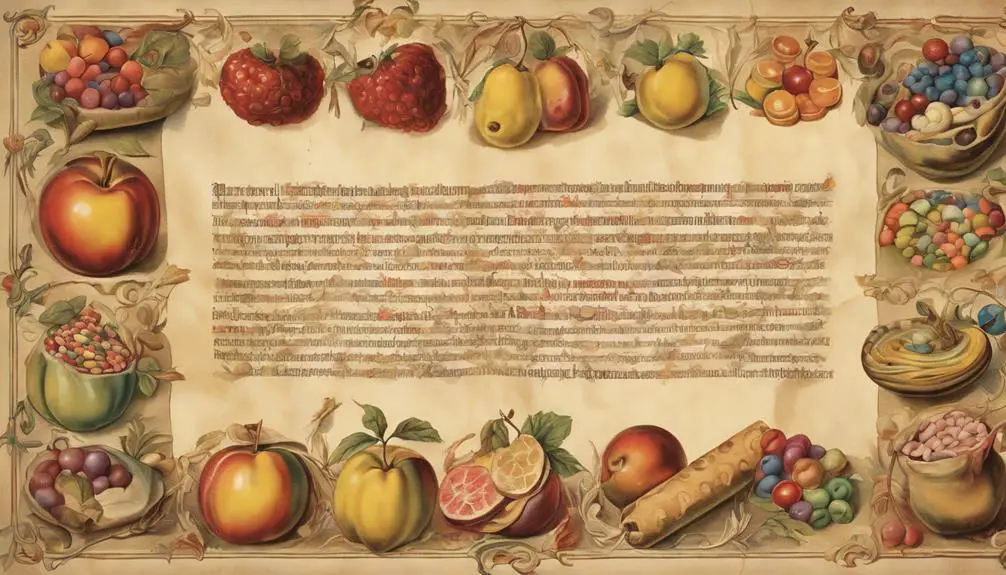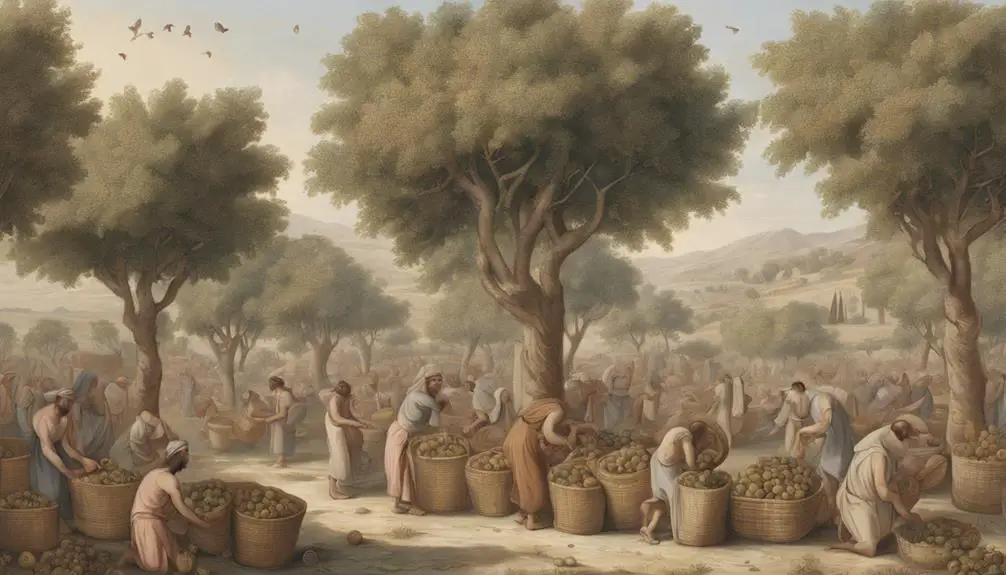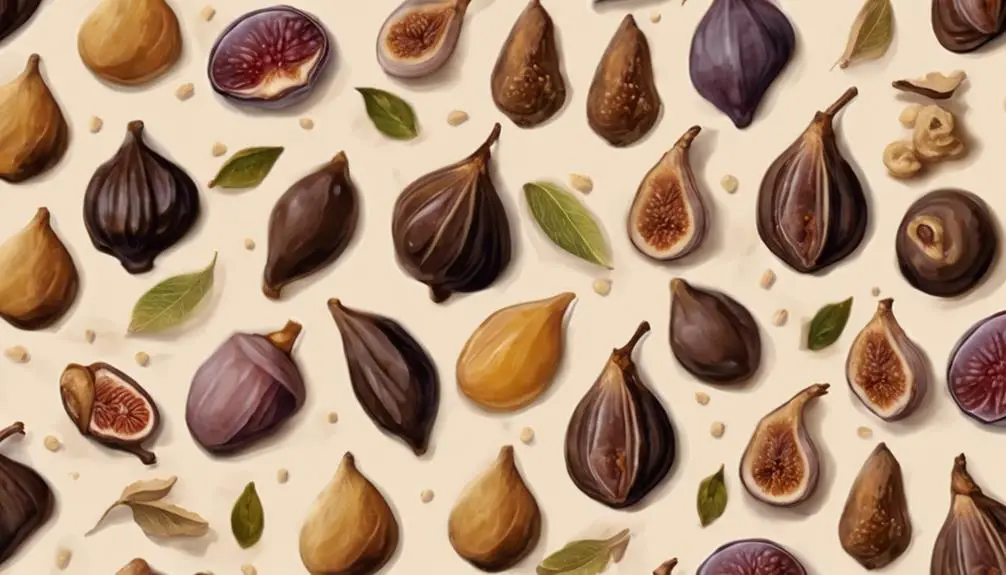Yearn for a deeper understanding of biblical treats and their symbolic significance with our intriguing journey into 'Candy in the Bible'.

Candy in the Bible
You've seen candy in stores, you've tasted it on your tongue, but have you ever pondered its presence in the Bible?
The Bible, though not mentioning candy as we know it, frequently highlights sweet substances like honey, dates, and figs. These ancient delicacies not only nourished the body, but often held deeper, spiritual symbolism.
So why not embark on a sweet exploration into the Bible's references to these treats, and uncover what they might symbolize in our lives today?
Key Takeaways
- Sweets, such as honey, figs, and dates, in the Bible symbolize God's blessings, abundance, and divine teachings.
- Honey, the primary biblical sweetener, signifies God's favor and the richness of His word.
- The act of preparing and enjoying sweets represents diligence in the spiritual journey and joy in God's relationship.
- Lack of processed sweeteners like sugar in the Bible emphasizes a diet focusing on natural, unprocessed foods provided by the earth.
Biblical References to Sweet Treats

Delving into the pages of the Bible, you'll find numerous references to sweet treats, symbolizing divine blessings, hospitality, and abundance. These aren't just idle mentions, they're purposeful narratives, embedded with theological and symbolic significance.
Take the Manna Miracles, for instance. In Exodus 16, you're introduced to manna, a sweet, flaky substance provided by God to sustain the Israelites in the wilderness. It's described as 'white like coriander seed and tasted like wafers made with honey' (Exodus 16:31). This isn't just a miraculous food supply; it's a Biblical confectionery, a divine sweet treat representing God's provision and care.
In Numbers 11, the Israelites' complaint about manna reveals a deeper theological message. Their dissatisfaction indicates an ungrateful attitude towards God's providence, showing that even sweet blessings can be taken for granted.
Lastly, Ezekiel's scroll in Ezekiel 3:3 is another sweet symbol. When Ezekiel eats the scroll, as instructed by God, he finds it as sweet as honey. This signifies the sweetness of God's word, even in its judgments.
In essence, these Biblical sweets aren't mere gastronomical delights. They're layered with divine implications, teaching lessons about gratitude, obedience, and the nature of God.
Honey: The Divine Nectar

Undeniably, honey holds a prominent place in biblical symbolism, emerging as the divine nectar that embodies God's favor and providence. This sweet substance signifies the blessings, goodness, and abundance that flow from the Creator. You'll find numerous references to honey throughout the Bible, symbolizing the richness and sweetness of divine wisdom and teachings.
Now let's delve into 'Beekeeping in Biblical Times.' In ancient Israel, beekeeping was a common practice, and honey was a staple in the diet. Scriptures mention 'land flowing with milk and honey,' depicting a land of abundance and fertility. Bees and their hives were often found in rock crevices and tree hollows, providing a constant supply of this divine nectar.
Honey's medicinal use in the Bible further accentuates its significance. It wasn't just a sweet treat, but a healing agent too. Proverbs 16:24 likens gracious words to honeycomb, 'sweet to the soul and healing to the bones.' This reflects the dual role of honey as both a physical and spiritual sustenance. So, you see, honey isn't just a sweet delight—it's a potent symbol of God's providential care and benevolence.
Dates and Figs: Ancient Delicacies

Apart from honey, ancient Israelites also relished dates and figs, two of the most treasured delicacies of biblical times. These fruits weren't just mere foodstuffs; they held spiritual significance, integral to their religious and cultural practices.
Delving into the dates cultivation history, they were revered for their sweet, satisfying taste and hardy nature. The date palm was a symbol of prosperity and abundance, its fruit a staple in their diet.
- Dates were often dried and preserved for future use.
- They were also used in the making of sweet wine.
Switching to figs, their preparation methods were diverse and imaginative. Fig trees were ubiquitous in Israel, and the figs they bore were a highly anticipated treat.
- Figs were eaten fresh during the harvest season.
- They were also dried, becoming a common ingredient in bread and cakes.
In essence, dates and figs were more than just ancient sweets; they were symbols of God's providence, reminders of His generosity and sustenance. Their sweetness was a tangible testament to the goodness of the Creator, a foretaste of the promised land's bounty.
Sugar in Scripture

While the sweetness of dates and figs may have been a divine testament to the Israelites, it's interesting to note that sugar itself doesn't make an appearance in the Bible. You won't find any 'Saccharine Prophecies' indicating that the sweetener was part of the ancient Biblical diets. This isn't surprising given that sugar was unknown to the ancient Middle East, being a relatively late arrival to global cuisine from Southeast Asia.
However, the absence of sugar doesn't mean the Bible is devoid of sweet substances. Honey, for instance, plays a significant role throughout scripture, but it's a natural sweetener, not a processed one. The lack of sugar, in a sense, strengthens the theological argument for natural, unprocessed foods as part of divine design. The Biblical diet, as you understand, was about consuming what the earth naturally provided.
Despite sugar's absence, the Bible still offers a rich tapestry of culinary references, both literal and metaphorical, that tell us a lot about the historical and spiritual context of the times. The lack of sugar in scripture, then, serves as a reminder of the simple, unprocessed diet of our ancestors and the divine providence they relied on.
Spiritual Symbolism of Sweets

Delving into the spiritual symbolism of sweets, you'll find that these treats often hold profound meanings in the biblical context, serving as metaphors for spiritual richness, divine blessings, and the sweetness of God's word. These 'Spiritual Desserts' and 'Divine Confections' aren't merely physical indulgences, rather they serve to signify deeper spiritual truths.
Let's examine some specific representations:
- Sweets often symbolize God's blessings and favor. Just as honey and candy are delightful to the taste, God's blessings enrich our lives, making it sweeter.
- The sweetness stands for the beauty and richness of God's word. Like a honeycomb, it's filled with wisdom, guidance, and life-giving sustenance.
- The preparation of sweets, especially in biblical times, required time and effort, signifying the diligence needed in our spiritual journey.
- Finally, the enjoyment of sweets, often associated with celebration, signifies the joy and satisfaction found in a relationship with God.
Frequently Asked Questions
What Are Some Traditional Recipes for Biblical Sweets That Can Be Made at Home?
You're asking about traditional recipes for biblical sweets, right?
Well, honey cakes represent Biblical Sweet Symbolism, and they're easy to make at home. Likewise, fig cakes, made from dried figs, illustrate Ancient Sweet Preservation methods. Both of these treats are deeply tied to Biblical times and culture.
Just remember, it's not about creating candy, but rather, recreating historical delicacies that offer a taste of the past.
How Has the Consumption of Sweets in Biblical Times Influenced Modern-Day Confectionery?
You'll find that biblical desserts have influenced modern confections in interesting ways. Sugar symbolism, for instance, was significant in biblical times. It represented purity and sweetness of faith. This notion has been carried into today's sweet treats.
The traditions, recipes, and symbolism from biblical times have laid the groundwork for our current confectionery practices. While we've innovated, the roots remain firmly in these ancient traditions.
Were There Any Specific Religious Ceremonies or Festivals in the Bible That Incorporated the Use of Sweets?
You're curious about religious ceremonies or festivals in the Bible that used sweets.
Honey, often symbolizing 'Sacred Sweetness,' was a key ingredient in religious festivities.
Think of it as the Biblical Honey. Although it wasn't candy as you know it, this sweet substance played a crucial role in offerings and celebrations, showcasing the close link between spiritual practices and the enjoyment of natural sweeteners.
Are There Any Biblical Restrictions or Rules Related to the Consumption of Sweets?
There aren't specific biblical restrictions on eating sweets. The Bible doesn't directly mention sugar symbolism or biblical desserts.
However, you're encouraged to eat in moderation, focusing on foods that nourish the body. Gluttony is cautioned against. So, while you can enjoy sweets, moderation is key.
Still, it's important to note that sweets as we understand them weren't commonly available during biblical times.
How Did Ancient Civilizations, as Mentioned in the Bible, Source or Produce Their Sweets?
You're wondering about ancient sweets mentioned in the Bible. They didn't have our modern sugar trade routes. Instead, they used natural sweeteners like honey, figs, and dates.
The land was flowing with milk and honey, remember? Bees were commonplace, making honey a readily available sweetener. Figs and dates, also naturally sweet, were abundant in the region.
These Biblical sweeteners were the foundation of their sweet indulgences.
Conclusion
Indeed, you've seen how the Bible subtly highlights the allure of sweet treats like honey, dates, figs, and sugar. These aren't just tasty delights, but they carry deep spiritual symbolism, signifying God's divine blessings, joy, and abundance.
They're more than just ancient indulgences. They're divine metaphors, whispering of God's sweet providence. So, next time you savor a sweet treat, remember the biblical undertones, and feel a closer connection to the divine.



Sign up